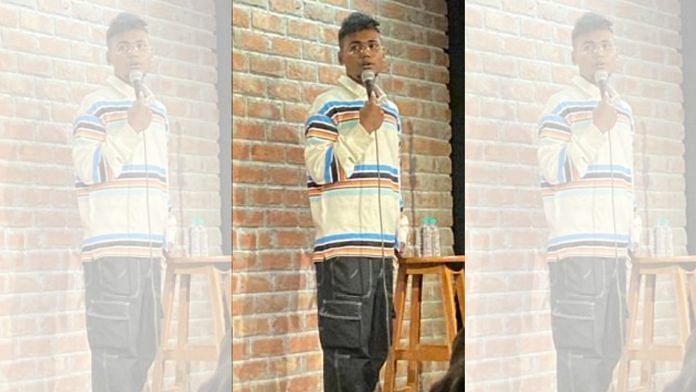He won’t crack jokes about Tinder dating, arranged marriages or Indian mall culture. In his sold-out Delhi show called ‘Untouchable’, Dalit stand-up comedian Manjeet Sarkar had a single goal: to make his audience shift uncomfortably in their seats.
From Brahmin ignorance to liberal guilt, Naxal’s ignorance about Karl Marx to right-wing spelling mistakes and embarrassingly dumb questions journalists ask – Sarkar spared no one in his relentless, power-packed performance.
In all this, laughter was his last mission. In fact, Sarkar said, if a joke is too popular, he would change it. In that respect, he is a comic like no other.
Sarkar opened his show with his now-popular punchline: ‘I am Dalit but Identify as Brahmin,’a biting remark aimed at exposing the centuries of oppression endured by Dalits under the oppressive caste system.
The comedian’s experiences with audiences in the past came up laced with a remark that not only spoke for his show but also about India’s everyday social reality: “A lot of people come just to heckle. but I have my defence mechanism ready for them—I just touch them.”
Sarkar’s matter-of-fact delivery style works like a spell. And his brilliance at combining his social commentary with common facts forces his audience to not merely consume his ‘jokes’ but also think about them. Like when he says he makes people Dalit. “I touch them, they take a bath in Ganga but it’s so polluted that no one is touching them later.”
Capitalism became his next target, as he wasted no time in holding up a mirror to the privileged audience, forcing them to confront their own advantages and societal positions.
Also read: The India that Vir Das and liberals want – and the one they won’t talk about
Common themes, different outlook
True to his word, Sarkar delved into his personal journey, recounting his upbringing in a village in Chhattisgarh’s Bastar and highlighting instances of caste oppression.
However, the true brilliance of Sarkar’s performance lay in his ability to tackle not only the struggles faced by Dalits but also broader societal issues. Themes such as depression, mental health, domestic violence, child labour, and religion were deftly interwoven into his satirical repertoire, ensuring that the audience was engaged on multiple levels.
As the show unfolded, Sarkar forced us to look at topics like depression differently than what we are accustomed to—by reminding us about the difference between the ability to acknowledge mental illness and seek treatment for it. He playfully pointed out that these concepts were foreign to people in his village and are ‘reserved’ for the affluent. In his village, he quipped, the solution to feeling down was marriage, and the more depressed one felt, the more children they would have—an amusing take on measuring happiness.
For the much-maligned over-thinkers, Sarkar came out like a true ally: “Overthinking is an ability. The other person is just thinking. I am thinking more. You have brains. I have more brains than you.”
Sarkar then shed light on the lack of awareness surrounding feminism and sexism, contrasting the perceived urban superiority. He boldly called out the audience, asserting that despite their familiarity with these terms in the age of social media, they often engage in various forms of sexism, thus highlighting the irony of their supposed enlightenment. Sarkar’s comedic commentary challenged societal norms and invited introspection, injecting a dose of laughter into uncomfortable truths.
Also read: ‘I’m Dalit but identify as a Brahmin’ — How Dalit comedians in India are smashing elite nexus
Leaving with a desire for change
In a poignant revelation, Sarkar joked how he felt superior to his classmates in school for getting water in a glass meant only for him. But this feeling of superiority was shattered later by an anecdote that not only illuminated the deep-rooted awareness of his Dalit identity but also left him physically and emotionally wounded. Sarkar recounted how he was pelted with stones by a woman for daring to drink water from a hand pump. It was through such traumatic experiences that a Dalit child comprehends their place in society, grappling with the profound implications of being Dalit.
Yet, amid his journey, Manjeet Sarkar remained resolute in his conviction that media coverage often misrepresented his background. Journalists frequently depicted him as a member of a Bangladeshi refugee family, settled in Chhattisgarh, who endured the hardships of child labour. While this narrative held elements of truth, Sarkar fervently asserted that it mirrored the reality of countless Dalit children. He passionately expressed a desire for empathy rather than mere sympathy, urging the media to highlight his achievements rather than dwell solely on his struggles.
In a memorable encounter with a white journalist, Sarkar faced perplexing questions: “Does India need more Dalit comedians?” and “Why don’t you tell a Dalit joke?” The audience was startled, but Sarkar swiftly diffused the tension by saying he can’t get offended like others. “I am a comedian, I told her (journalist) a joke: ‘My girlfriend is Brahmin’,” he said.
Through his incisive humour, Manjeet Sarkar succeeded in delivering a thought-provoking and intellectually stimulating performance. His show not only entertained but also challenged the prevailing notions of privilege and caste dynamics, leaving the audience with a renewed sense of introspection and perhaps even a desire for change.
(Edited by Prashant)



